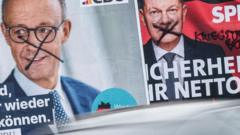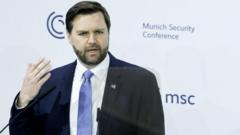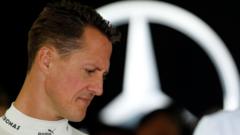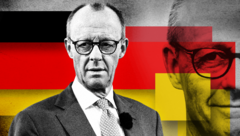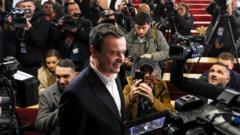The head of the Christian Democratic Union, Friedrich Merz, positions himself for the upcoming parliamentary election amidst challenges linked to a controversial immigration policy vote, demonstrating a mix of resilience and polarizing influence on the German political scene.
Friedrich Merz: Navigating Challenges Ahead of Germany's Directional Election

Friedrich Merz: Navigating Challenges Ahead of Germany's Directional Election
As Friedrich Merz seeks the chancellorship, he faces political scrutiny yet appears resilient in public support despite recent controversies.
Friedrich Merz, leader of the Christian Democratic Union (CDU), is gearing up for what he has termed a "directional election" in Germany, scheduled for February 23. Recently, Merz found himself in a contentious political atmosphere, provoked by a controversial move to collaborate with far-right parties to enact stricter immigration laws, a decision that defied decades of CDU policy.
This political gamble initially prompted backlash and scrutiny from across the political spectrum, creating openings for rival candidates to capitalize on his misstep. However, recent polls suggest the impact on Merz's popularity has been minimal, as he retains a steady grasp among voters. While critics label him a more divisive figure now, those within his party note he continues to navigate through political waters with the confidence of a seasoned captain.
Merz's rhetoric has cleverly pivoted to emphasize citizen frustrations with bureaucratic overreach, a theme he underscored during a recent public appearance in Stromberg, where he connected car regulations to broader government interference affecting the economy. Highlighting EU's regulatory measures, he painted a picture of increasing regulatory burdens dampening the economic spirit of the country.
Despite the turbulence surrounding his recent decisions, Merz remains focused on positioning himself as a stable candidate for chancellor. His experience as a businessman fuels his approach to economic issues, resonating with those who prioritize economic growth and stability in Germany.
As the parliamentary election draws closer, the dynamics of Merz’s leadership will be crucial in determining the CDU's fortunes, especially as he juggles the responsibilities of maintaining party unity while facing ongoing discontent from various factions within the political landscape. His ability to balance these narratives could significantly influence the path Germany takes in the next electoral cycle.



